That the only major opposition to America’s current government is the target—at present—of two assassination attempts within weeks of a historic election alarms me. By my estimate, that Donald Trump is the target of assassination does not alarm most Americans. On the contrary, some—perhaps many—Americans ignore or evade the murder of an American fireman for Trump and regard the attempted murder of the 45th U.S. president as humorous. Or, worse, they’re agnostic about conspiracy to assassinate Trump. This article examines the history of assassination in America, the enthusiasm to kill Trump and the largely undetected conspiracy or conspiracies to assassinate the 45th president. I also assess the consequences, which I think propel America toward dictatorship, of the zeal to annihilate Trump. I offer a salve.
Hours ago, an independent government commission appointed by President Biden made serious recommendations to completely change the U.S. Secret Service—the Washington Post refers to the document’s ideas as the “among the most sweeping changes proposed for the Secret Service in its 159-year history.” The Post notes that the state agency, created in 1865 under the U.S. Treasury Department to investigate counterfeiting, which started protecting U.S. presidents at Congress’s request after the 1901 assassination of President William McKinley, is born and defined by an attempt to fake and assassinate American government.
President McKinley was assassinated by Leon Czolgosz, an anti-capitalist (and anarchist) inspired by anarcho-socialist Emma Goldman’s call to violence on behalf of the “workers’ revolution” and by an anarchist’s assassination of an Italian monarch a year earlier. Czolgosz, who held America, capitalism and the presidency in contempt, particularly sought to destroy America’s 1901 economic system, which he denounced based on what he held was an inherent inequality between the wealthy and workers. This is today’s dominant philosophy of the Democratic Party.
Over a year into Joe Biden’s presidency, after he finally delivered his first major press conference, I wrote a critical assessment of the Biden administration, noting that he:
failed to protect Americans during the collapse of Afghanistan. Meanwhile, as Communist Korea launches missiles and Communist China accelerates its militarism, threatening the U.S., Iran promotes plans to assassinate President Trump, yet [Biden] still negotiates with the Islamic dictatorship. (Emphasis added).
Accordingly, this summer’s first assassination attempt on Trump’s life horrified me. The cause of my horror is not limited to the dread or disgust one might experience at news of attempted murder. Serious violent crime is disturbing. What happened on the eve of Trump’s nomination in Milwaukee, Wisconsin was generally regarded as if assassination is acceptable grist for today’s cynical humor mill. A Democrat friend who admires Barack Obama joked that Trump’s wife, Melania, probably ordered a hit on her husband. Comedians joked, too. The press barely asked about the assassin or his motives.
My horror was compounded by public reaction. Within hours of the July 13 attempt, a woman joked to me that when VIPs—such as Malcolm X, Kennedys and Martin Luther King—were assassinated in the Sixties, “assassins didn’t miss their targets.” “Back then,” she said with giddy anticipation, “they had better aim.” I thought that was her punchline. But she whispered with delight: “If only today’s assassin did, too.” The woman let out a maniacal, cackling laugh. Her husband simply looked down.
Trivializing life—often by those who feign outrage over a Capitol Hill crime they claim was an incited insurrection (which, in my view, was an instigated or spontaneous riot)—has become socially acceptable in these disunited states of America. Mired in corruption, random crime, drug abuse, inflation, confusion and despair, Americans face food, financial and housing anxiety. There’s a sense that lives are in turmoil. Assassination of the leading oppositional candidate threatens the U.S. electoral process, which righteous Democrats frequently distort, seek to destroy and act to weaken in the name of democracy, and destabilizes the nation. If and when Trump is assassinated, the country’s likely to take a nosedive into something worse.
Measuring one’s response to such a prospect—particularly when the person targeted for death is a top U.S. government official or viable presidential candidate—matters. Assassination is a serious threat. Unity is our best defense and unity starts with civility. Civility among Americans—particularly among those who claim to hate or dislike Trump for being vulgar or uncivilized—has worsened; anti-Trumpers, to borrow their pet derogatory term, vilify Trump while openly aping Trump’s tantrums.
Modern History of Assassination
Let me contextualize assassination. I do not pretend that assassination’s always wrong. Certain foreign assassinations of dictators, thugs and murderers may be justified or at least desirable. For example, had a proposal to assassinate Ayatollah Khomeini before the mystic became Iran’s dictator not been rejected by President Carter, Khomeini would not have lived to slaughter Americans, order the assassination of writer Salman Rushdie and oppress Iranians.
Similarly, had President Clinton approved the military plan to assassinate the chief terrorist that later plotted the 2001 attack on America, thousands of Americans would have been spared and the World Trade Center might still stand tall (according to a PBS film, Clinton declined to kill Bin Laden—because the terrorist was hiding in a militarized tent designated as a mosque).
President Trump, whom Iran named in an assassination order, became the first American president to militarily retaliate against Iran for killing Americans; as commander-in-chief, Trump gave the order to kill the Iranian military leader who’d planned mass murder of U.S. soldiers in Iraq. Similarly, a conspiracy to assassinate Adolf Hitler, which failed (the Valkyrie conspirators were hanged from meat hooks by piano wire in executions Hitler ordered to be filmed) was also justified.
Domestically, as I wrote about a previous flashpoint for mass leftist outrage on my blog in 2017 (“The Hush of Charlottesville”):
“The left, especially Communists and anarchists, has a long history of trying to destroy the U.S. government, from assassinating presidents to riots, whether attacking President Truman, the Standard Oil Building or Carnegie Steel with anarchists, Puerto Rican terrorists or the Unabomber. So, too, does the right, from assassinating President Lincoln to blowing up a federal building in Oklahoma City and abortion clinics with Confederates, Christian terrorists and various misanthropes. The worst monsters in history, from Charles Manson and the Rev. Jim Jones to Adolf Hitler and Josef Stalin, spawn from the left…
Leftist U.S. political strategy, I know firsthand and this originates with the New Left, is systemized to initiate the use of lower levels of force, such as throwing rocks at police and others they oppose, in order to provoke greater acts of force in defense or counter-offense. As we’ve seen with the vile, racist thugs of the right, followed by the president’s outrageous equivocation, the right responds to the use of force with the use of force. So, the cycle disrupts civil law and not in some benign display of civil disobedience. The use of force as a means of resolving disputes becomes more common. Judges are shot (the most recent by a rapist’s father in Ohio). A left-wing terrorist from Illinois attempts this summer to assassinate members of Congress. The assault on Dallas police, too, which murdered five police officers, is committed by a racist who cited Black Lives Matter and says he sought to kill white policemen.”
Is attempted assassination of Trump and police officers as known and reviled as the killing of George Floyd? Does disregarding life matter?
Attempted Assassination from Warhol to Rushdie and Trump
The 1968 attempt to assassinate Andy Warhol by feminist Valerie Solanas parallels the 2022 assassination attempt on Salman Rushdie by a religionist. Like the Trump and Rushdie assassination attempts, innocent men were wounded in the shooting of Warhol, who, like Rushdie, was targeted at least by implication for being blasphemous to the assassin’s faith (in feminism, the belief that females are inherently superior to males).
The July 13 attempt on Donald Trump’s life by 20-year-old Thomas Crooks, who programmed a drone to fly over the Western Pennsylvania farming grounds before his assassination attempt on the 78 year-old former president, remains cryptic.
Investigators suspect Crooks directed the remotely piloted aircraft around the campaign rally site “more than once,” according to a report, “as he mapped out the course of the attack, further adding to the Secret Service’s stunning failure to protect Trump.” Crooks registered for the Trump rally days in advance, according to the Associated Press (AP).
Crooks aimed and fired upon Trump with at least six rounds from a semi-automatic rifle while stationed on a roof 130 yards from where Trump spoke, grazing Trump’s ear, nearly killing the former president. Crooks shot and killed Corey Comperatore, a retired fireman and father of two, and seriously wounded David Dutch, 57, and James Copenhaver, 74, before the Secret Service shot and killed Crooks. His car was found with explosives and a drone. Both President Biden and Vice-President Harris denounced the attack. No one’s established, let alone explained, the assassin’s impetus, motive or operations, i.e., funding, in the plot to kill Donald Trump.
The Wall Street Journal reports that Crooks also allegedly received several packages to his home in recent months marked “hazardous materials.” Despite Crooks being spotted and tagged as a “character of suspicion,” according to the AP, President Trump was allowed to step up and deliver his speech in Western Pennsylvania. The New York Post reports that, prior to the shooting, Crooks, who tracked Trump as early as this spring, left “no social media or online footprint.” Investigators reportedly examined his devices, including a laptop, two phones and “USB drives with a combined 4.5 terabytes of data”.
Days after Trump was grazed by a bullet, 68-year-old Michael M. Wiseman was accused by Jupiter, Florida police of making “written threats to kill” Donald Trump and his running mate, Sen. J.D. Vance, as well as Vance’s and Trump’s families. Again, public and institutional response was tepid. Weeks later, a lone Secret Service agent spotted the barrel of a rifle in the bushes of Trump’s West Palm Beach country club as the former president golfed a few hundred yards away. Agents reportedly opened fire but the gunman, Ryan Routh, escaped. Federal police contend that Routh, who was later caught and arrested, had been lying in wait to assassinate Trump—undetected for approximately 12 hours. National Public Radio reports that Routh, who spent time scouting both Trump’s golf course and Mar-a-Lago home, declared in writing months ago that he intended to assassinate Donald Trump.
Additionally and interestingly, Routh advocates President Barack Obama’s Iran deal—opposed by Trump, Israel and Nazi death camp survivor Elie Wiesel, who pleaded against Obama’s Iran deal during a speech to a joint session of Congress—and the war against Russia in Ukraine. A cellphone found in Routh’s SUV shows he searched how to travel from West Palm Beach to Mexico. According to CBS News, during a search of Routh’s vehicle, “the FBI found additional license plates, six cellphones, 12 pairs of gloves, a Hawaii driver’s license in Routh’s name, and documents…The FBI said the license plate on the SUV was not registered to that vehicle.”
A few days after Routh’s assassination attempt, a man said Routh had dropped off a box at his house several months earlier. After learning of the September 15 assassination attempt, the man said he opened the box, “which contained ammunition, a metal pipe, building materials, tools, four phones and several letters, according to prosecutors.” [Source: CBS News]. Prosecutors claim that Routh was convicted in December 2002 of possession of a weapon of mass destruction. He was also convicted in March 2010 of multiple felony counts of possession of stolen goods.
CNN reports that Routh wrote a book in which he urged Iran, which has officially threatened to assassinate at least two American presidents—the late George Bush and Donald Trump—“to assassinate Trump” for dismantling the Iran deal. Prosecutors claim that Routh, who traveled to Ukraine to fight against Russia and may have obtained assassination weapons in Ukraine, has been arrested over 100 times. A notebook found in Routh’s Nissan Xterra reportedly contains information on how to join Ukraine against Russia.
Can you imagine the media coverage had a pro-Russian Harris assassin been caught with weapons possibly obtained in Russia?
This week, 49 year-old Las Vegas resident Vem Miller was taken into custody after peace officers found guns in his car near a Trump rally in Coachella, California, according to Riverside County Sheriff’s deputies. Deputies had stopped Miller—who’s been linked to or affiliated with a conservative “sovereign” political movement—at a Coachella checkpoint. Miller was unlawfully in possession of a shotgun, a loaded handgun and a high-capacity magazine, according to deputies. Miller had numerous passports and drivers’ licenses under various names. Miller’s SUV also had fake plates.
Why Attempts to Assassinate Trump Matter
Assassination of the leading opponent to the current government during a close, hotly contested campaign weeks before Election Day looms over the 2024 presidential election. The press, the public and the government ought to be extremely interested in going by facts and urgently, vigilantly investigating these plots to assassinate Donald Trump. Everyone ought to be motivated to de-escalate inflammatory campaign rhetoric—this of course includes the often inflammatory Trump and his campaign—because the future of the American republic being a republic is at stake.
“Violent political sentiments used to be held by fringe groups that were disavowed by major political parties,” Carnegie Endowment for International Peace scholar Rachel Kleinfeld, who studies polarization and violence, told Time in 2022. Though she blames the right, Kleinfeld admits that political violence is “growing in acceptance on the left.” In the same article, Johns Hopkins University political scientist Lilliana Mason told Time that a “growing number of Americans [regard] people they disagree with politically as evil, less than human, and a serious threat to the nation.”
Time’s 2022 article cited a poll showing that 64 percent of respondents said they think political violence would increase in the future. With conspiracies—that’s the word—to assassinate Donald Trump apparently posing an imminent threat to his life and the sanctity and stability of this election and nation, attempts do appear to be escalating.
Is a foreign state, such as Iran, which has vowed to assassinate Trump, sponsoring the attacks? Are assassination attempts being vigorously investigated by police and the press? Who are these assassins? Who, if anyone, sponsors the plots?
Joe Biden denounced the first attempt to murder his opponent. Biden said:
An assassination attempt is contrary to everything we stand for as a nation. Unity is the most elusive goal of all. But nothing is more important than that right now. We’re going to debate, we’re going to disagree, but we cannot lose sight of who we are as Americans.”
Cynical leftist TV host Bill Maher took the stage at his comedy show hours after Trump was nearly killed and told the audience: “I unequivocally denounce [the assassination attempt], I don’t care what you think about that. Not funny. I’m sure that there will be jokes that people will make because they hate him so much that they wished it went the other way. Not for me.”
A principled response came from Butler, Pennsylvania’s mayor. According to the Pittsburgh Post-Gazette, Democrat Bob Dandoy said: “These people that were at the rally were involved in and exercised the most basic fundamental rights that we cherish as Americans: to assemble and to have free speech. Any attack on anyone’s rights in that category is an attack on all of our rights, and we’re never going to enjoy that peace and order that we want when this kind of thing continues to happen.…It’s happening to all of us. It's an affront to all of us.” (Emphasis mine).
After the deadly July 13 Butler, Pennsylvania shooting, as he was being guided off the bloodied platform, Donald Trump—possibly not knowing whether he was still under siege—urged supporters to “Fight!” This elicited cheers from the audience. One Trump supporter, Danny Altmire, 56, told Time: “I’m shocked that someone was able to get a shot off, but not that they attempted to do it.”
This—the notion that random assassins, roving gangs and mob rule are presupposed—is what the civilized American is up against.
My first memory of assassination came early in my life. I was a toddler watching television—a black and white Zenith television, as I recall—when a Palestinian reached and pointed a gun and shot a presidential candidate in Southern California, where I lived with my family at the time. Watching the Ambassador Hotel assassination live on that June day in 1968 with my mother, I remember that, to her credit, she almost instantaneously, as if by instinct, burst into tears, covered her face and fled from the room into the bathroom to compose herself.
Robert Kennedy had been killed. I also remember George Wallace being shot. I recall twin assassination attempts in 1975 against President Ford, both by left-wing women, one of whom was part of the religious cult that committed mass murder in Southern California in 1969. As I recall, people rallied around President Ford, some acting to defend his life. Both assassination attempts took place in Northern California, an area dominated by extreme leftists and Democrats, where a religious Democrat assassinated a gay Democrat named Harvey Milk, launching the career of a grandstanding female Democrat named Dianne Feinstein, who dominated California’s politics for 40 years. I remember civil rights leader Vernon Jordan being shot, too, which I chose to write about at the time.
Later, I remember watching President Reagan and others, including a Secret Service agent, a policeman and the secretary of the press, get shot in the nation’s capital in an assassination attempt on Reagan’s life. Americans, led by the opposing party’s Speaker of the House Tip O’Neill, rallied around Ronald Reagan. The assassination attempt galvanized the nation. The attempt on Reagan’s life brought Americans together.
America’s unity was, in retrospect, a facade. Contempt for Trump is a separate, though relevant, topic. Hating Trump to the point of trivializing—which includes ignoring or “turning the other cheek” from—the value of a single life is pure nihilism. America’s on the brink of a major choice in our executive government. Americans—under threat of assassination—ought to unify, which means to take Trump’s life seriously, and assure a peaceful election to gain time to unite in the name of the ideals of an American republic. As President McKinley’s assassin once explained: “I was willing to sacrifice myself and the president for the benefit of the country.” Today’s patriot must be willing to be selfish—which, in this context, means being civil, in pursuit of uniting to preserve America as a free republic.
Related Articles and Links
Twenty-One Trump
At noon, the Trump presidency comes to an end. But Donald Trump’s legacy goes on. As Barack Obama’s minions swear oaths to uphold the Constitution, I contend that the 45th U.S. president has left the District of Columbia having made progress for America. Like Ford, Willkie and Goldwater, Republican presidential nominees who lost and proved to be right,…
The White House Anti-Press Conference
For less than two hours at the White House yesterday, Joe Biden whispered, yelled and mostly stalled the press. Biden’s media presentation was emblematic of his failure as the 46th president of the United States.
Movies: The Ghost Writer
The Ghost Writer, directed by Roman Polanski, who co-wrote the script with Robert Harris, whose 2007 novel The Ghost is the basis for this film, explicates the death of art.
The Storming of the Capitol
Do you know what happened one year ago today? Can you honestly say you know who stormed the U.S. Capitol on January 6, 2021? Do you know in what sequence events happened—and where, when, how and why? Do you know the names of those killed or accused? Before answering these basic questions, to use

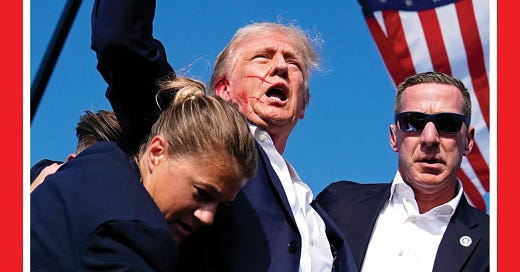



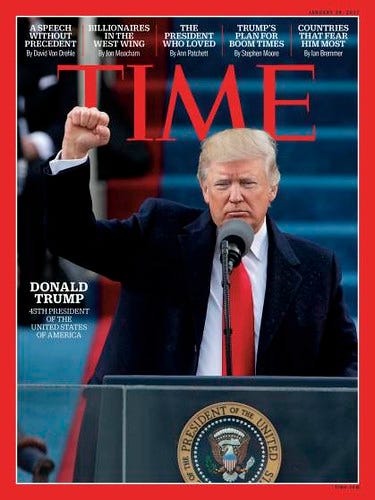
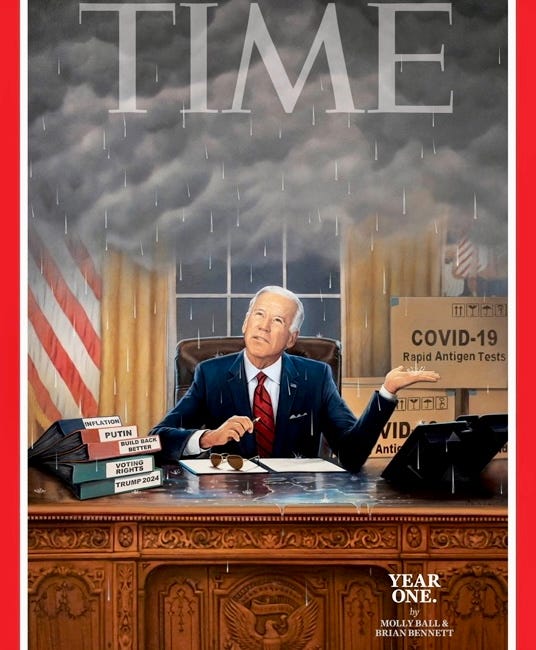
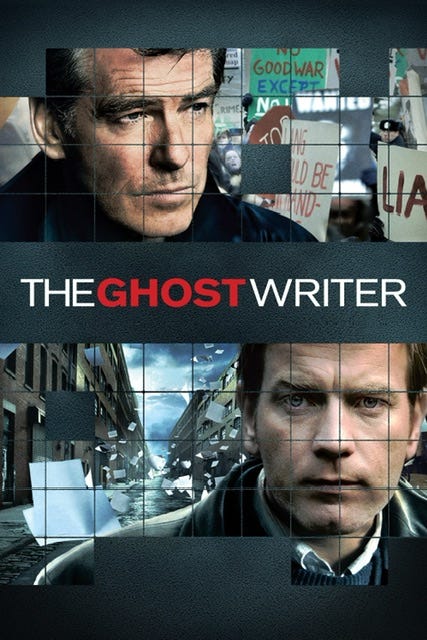
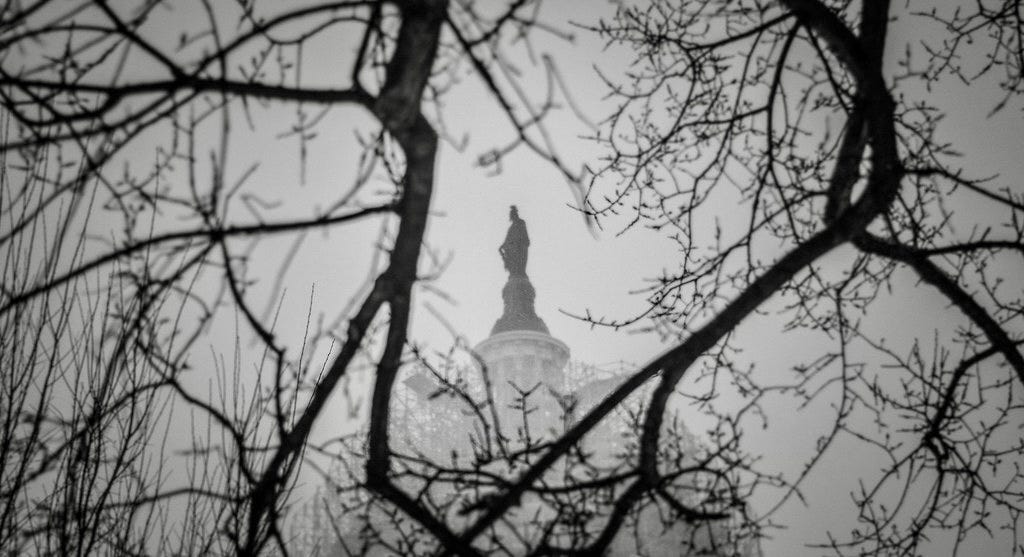

Hi Scott,
Another excellent article bringing objectivity to the forefront.
Mark